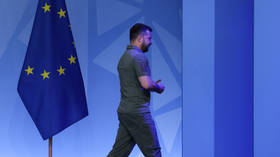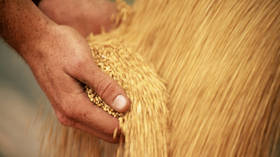Zelensky slams EU neighbors over grain exports

Eastern European nations that intend to preserve the current ban on imports of grain from Ukraine are violating the EU’s values, Ukrainian President Vladimir Zelensky has claimed.
The ban was imposed by the European Commission in May under pressure from Poland, Hungary, Slovakia, Romania, and Bulgaria, which were seeking to protect local farmers from Ukrainian competition. In a video address on Monday, Zelensky urged Brussels to let the restriction expire on September 15.
Any extension of the measure would be “unacceptable and obviously un-European,” the president declared. The EU is capable of “acting more rationally than closing this or that border for this or that good,” Zelensky said. Kiev wants a solution that “would correspond to the spirit of our Europe,” he added.
While Ukraine is not part of the EU it claims to share the bloc's values. Zelensky made the remarks following a government meeting on agricultural trade.
The EU initially lifted tariffs and quotas for Ukrainian exports in a bid to support the country in its armed conflict with Russia. However, the cheaper foodstuffs that flooded the bloc’s common market sent prices tumbling and caused mass protests by farmers in Eastern Europe. The five nations imposed unilateral restrictions before Brussels ended up conceding to their demands for a ban.
The campaign to keep the restrictions in place beyond the deadline was fueled by the collapse earlier this month of the Black Sea Initiative, a scheme that allowed Kiev to export its grain by commercial ships.
Russia pulled out of the arrangement a year after its signing, claiming that the deal had failed to live up to its humanitarian rationale. Russian officials also noted that the economic sanctions on Russian food and fertilizer exports were not lifted, contrary to what the UN, one of the deal’s mediators, had promised to Moscow.
Last week, Ukrainian Prime Minister Denis Shmigal cited the end of the deal in criticizing Poland’s stance on the EU-backed import restrictions. The position was “unfriendly and populist” and would “severely impact global food security and Ukraine’s economy,” he complained on Twitter.
Polish Foreign Minister Pawel Jablonski brushed off the criticism, stating that his nation was assisting Ukraine a lot. However, he added, Warsaw is guided by its own interests, including when it comes to helping Ukraine.













